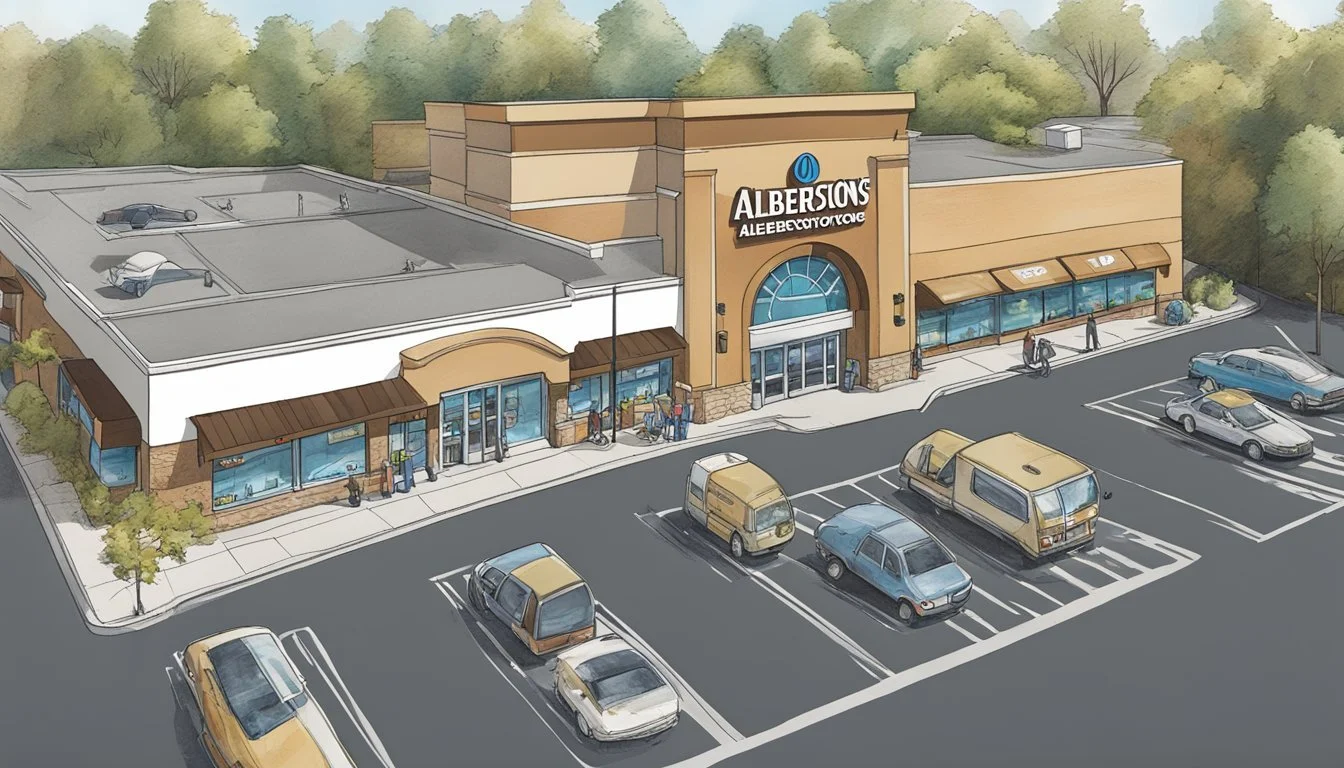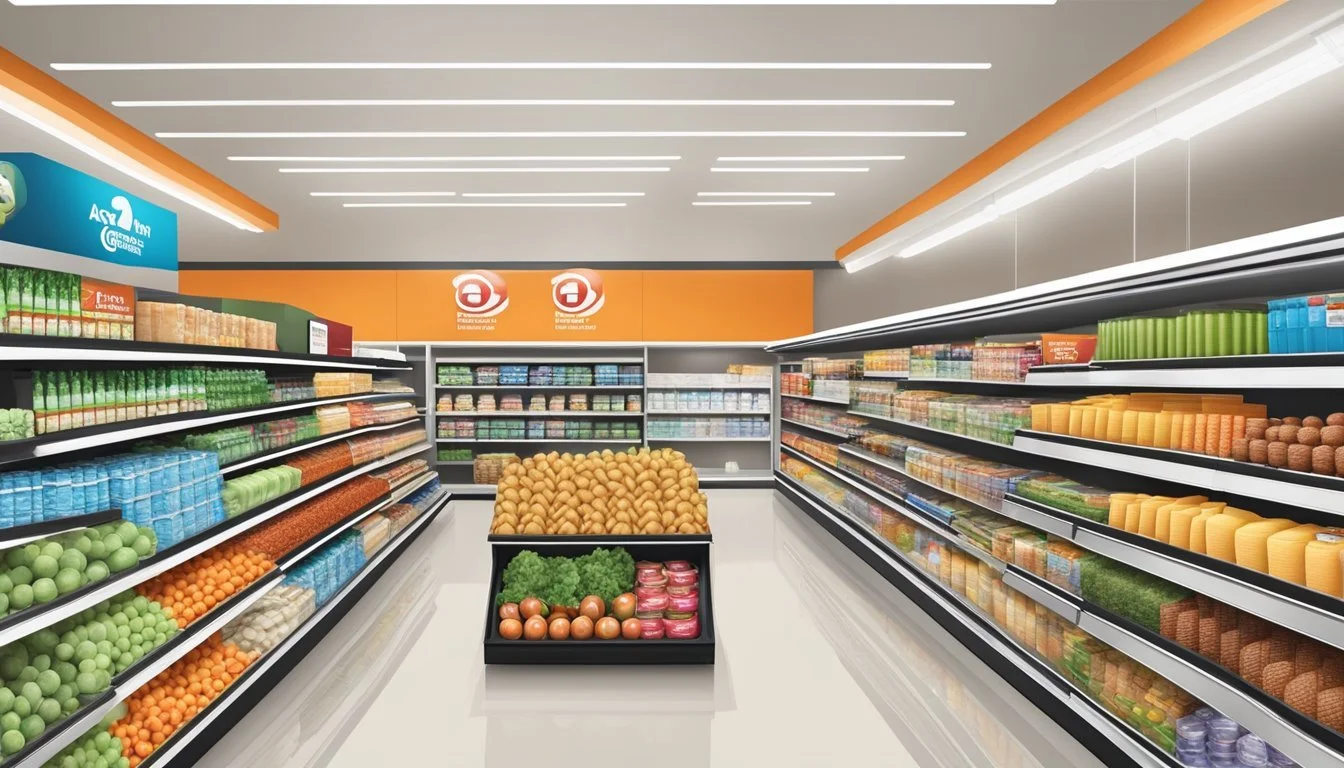Albertsons vs Family Dollar
Comparing Prices, Selection, and Customer Experience
Albertsons and Family Dollar are two distinctly different grocery store chains catering to diverse consumer needs. While Albertsons operates as a full-service supermarket, Family Dollar focuses on providing discount merchandise and limited grocery options.
Albertsons generally offers a wider selection of fresh produce, meats, and brand-name products, while Family Dollar provides lower prices on a more limited range of items. The choice between these stores often depends on individual shopping preferences, budget constraints, and specific product requirements.
Comparing these two retailers involves examining factors such as pricing, product variety, store locations, and overall shopping experience. Understanding the strengths and weaknesses of each chain can help consumers make informed decisions about where to shop for their groceries and household essentials.
Historical Background and Growth
Albertsons and Family Dollar have both become major players in the American retail landscape, though they took different paths to reach their current positions. Each company's journey reflects broader trends in the grocery and discount store industries.
Albertsons: From Boise to Nationwide
Joe Albertson opened the first Albertsons store in Boise, Idaho in 1939. The initial 10,000-square-foot location was significantly larger than typical grocery stores of the time. This innovative approach set the stage for Albertsons' future growth.
Throughout the following decades, Albertsons expanded across the western United States. The company went public in 1959, fueling further expansion. By the 1980s, Albertsons had become a major national chain.
Mergers and acquisitions played a crucial role in Albertsons' growth. Notable deals included the purchases of American Stores in 1999 and Safeway in 2015. These moves solidified Albertsons' position as one of the largest grocery retailers in the United States.
Family Dollar: Discount Chain Evolution
Leon Levine founded Family Dollar in 1959, opening the first store in Charlotte, North Carolina. The company's initial focus was on providing low-priced household goods and clothing to budget-conscious consumers.
Family Dollar's expansion was steady but deliberate. The company reached 100 stores by 1974 and 1,000 stores by 1985. Its growth strategy focused on opening stores in small towns and urban neighborhoods often overlooked by larger retailers.
In 2015, Dollar Tree acquired Family Dollar for $8.5 billion. This merger created one of the largest discount store operators in North America, combining Family Dollar's urban and rural presence with Dollar Tree's suburban footprint.
Family Dollar has faced challenges in recent years, including store closures and rebranding efforts to improve performance and differentiate from its parent company, Dollar Tree.
Store Footprint and Location Analysis
Albertsons and Family Dollar have distinct geographic footprints across the United States. Their store locations and market presence reflect different strategies in serving customers and competing in the grocery retail landscape.
Albertsons' Market Presence
Albertsons operates over 2,200 stores across 34 states and Washington D.C. The company has a strong presence in the Western United States, particularly in California, Washington, Oregon, Arizona, and Nevada. Albertsons' supermarkets are often found in urban and suburban areas, offering a full range of grocery products and services.
In California alone, Albertsons operates hundreds of stores under various banners including Safeway, Vons, and Pavilions. The company's footprint extends to the Mountain states and parts of the Midwest, with a significant number of stores in Colorado, Texas, and Illinois.
Family Dollar's Geographic Spread
Family Dollar boasts a more extensive network of over 8,000 stores across 46 states. Unlike Albertsons, Family Dollar focuses on smaller format stores typically located in rural areas, small towns, and urban neighborhoods.
The chain has a strong presence in the Southern and Eastern United States. States like Texas, Florida, and North Carolina host hundreds of Family Dollar locations each. The company's strategy involves placing stores in areas often underserved by larger supermarkets.
Family Dollar stores are generally smaller than Albertsons supermarkets, averaging around 7,000-9,000 square feet compared to Albertsons' typical 50,000+ square foot locations. This allows Family Dollar to fit into a wider variety of retail spaces and neighborhoods.
Product Range and Quality Comparison
Albertsons and Family Dollar offer distinct product assortments catering to different consumer needs. The range and quality of items vary significantly between these two retailers.
Assortment of Goods at Albertsons
Albertsons provides a comprehensive grocery selection. Its produce department features a wide variety of fresh fruits and vegetables, including organic options. The store's meat section offers diverse cuts from different animals, while the seafood counter typically stocks both fresh and frozen items.
Albertsons' dairy aisle contains milk, cheese, yogurt, and other dairy products from national brands and private-label alternatives. The bakery department produces fresh bread, pastries, and cakes daily.
The retailer carries an extensive range of national brands across all categories. Albertsons also offers its own private-label products, often at competitive prices.
Health-conscious shoppers can find a dedicated section for organic and natural foods. The store typically maintains high quality standards for perishable goods.
Family Dollar's Merchandise Mix
Family Dollar's product range differs significantly from traditional grocery stores. The retailer focuses on providing basic household essentials at low prices.
The store's food selection is limited compared to Albertsons. Family Dollar typically stocks a small assortment of packaged foods, canned goods, and frozen items. Fresh produce availability is often minimal or non-existent.
Family Dollar's dairy offerings usually include milk and basic cheese varieties. The store generally does not have dedicated meat, seafood, or bakery departments.
The retailer carries a mix of national brands and its own private-label products across various categories. Family Dollar's emphasis is on affordability rather than product variety or premium quality.
Healthy and organic options are usually limited at Family Dollar stores. The focus is on providing budget-friendly staples and household goods.
Pricing Strategies and Customer Savings
Albertsons and Family Dollar employ distinct pricing approaches to attract shoppers. Each store offers unique ways for customers to save money on groceries and household items.
Comparing Overall Prices
Albertsons typically maintains higher regular prices compared to Family Dollar. As a traditional supermarket, Albertsons stocks a wider variety of products, including fresh produce and specialty items.
Family Dollar focuses on providing everyday low prices across a more limited selection. Their smaller stores carry mostly packaged goods and household essentials at budget-friendly costs.
For staple items like canned foods, cleaning supplies, and personal care products, Family Dollar often beats Albertsons on price. However, Albertsons may offer better deals on fresh foods and name-brand groceries.
Discounts and Promotions
Albertsons runs frequent sales and promotions to lower prices on select items each week. Their loyalty program provides personalized deals and gas rewards to regular shoppers.
The supermarket chain also offers digital coupons and a mobile app for additional savings. Bulk purchases and store brand products can further reduce costs at Albertsons.
Family Dollar keeps prices consistently low but provides fewer promotional discounts. They occasionally offer in-store coupons and run seasonal sales events.
The dollar store chain's "Smart Coupons" program allows customers to load digital coupons to their account for extra savings. Family Dollar also promotes multi-item deals to encourage larger purchases.
Customer Experience and Service Level
Albertsons and Family Dollar offer distinct experiences for shoppers. Their service levels and in-store amenities cater to different customer needs and preferences.
In-Store Services and Amenities
Albertsons provides a more comprehensive shopping experience. Many locations feature full-service pharmacies, deli counters, and bakeries. Customers can often find floral departments and ready-to-eat meal options.
Family Dollar focuses on convenience and value. Stores typically have a simpler layout with fewer specialty departments. They offer a quick shopping experience for basic household items and groceries.
Albertsons usually has wider aisles and more checkout lanes, potentially reducing wait times during busy periods. Family Dollar stores are generally smaller, making navigation faster but potentially feeling crowded during peak hours.
Staff and Customer Support
Albertsons invests more in staff training and customer service. Employees are often knowledgeable about product locations and can assist with specific requests. Many stores have dedicated customer service desks for returns, exchanges, and inquiries.
Family Dollar operates with a leaner staff model. Employees handle multiple roles, from stocking to checkout. This can lead to shorter wait times for simple transactions but may result in less personalized assistance.
Both chains offer loyalty programs. Albertsons' program typically provides more personalized offers and digital coupons. Family Dollar's program focuses on straightforward discounts and occasional promotions.
Albertsons generally provides a higher level of customer support, including options for online ordering and delivery in many areas. Family Dollar's services are more limited but align with their focus on quick, budget-friendly shopping.
Brand Position and Consumer Perception
Albertsons and Family Dollar occupy distinct positions in the grocery retail landscape, appealing to different consumer segments. Their brand strategies and market approaches shape how shoppers perceive and interact with each retailer.
Albertsons' Brand Value
Albertsons has focused on elevating its private label offerings to compete with national brands. The company consolidated its store brands to strengthen consumer recognition and loyalty. This strategy aims to position Albertsons as a provider of quality, affordable options.
A recent FMI report indicates growing consumer confidence in private label products. Shoppers increasingly view store brands as "good," "great," and of high "quality." This trend benefits Albertsons' brand positioning efforts.
Albertsons' private labels span various price points and quality tiers, catering to diverse consumer preferences. This range allows the retailer to attract both value-seeking and premium shoppers.
Family Dollar's Market Position
Family Dollar targets budget-conscious consumers, positioning itself as a neighborhood discount store. The brand focuses on offering everyday essentials at low prices, appealing to cost-sensitive shoppers.
As part of the Dollar Tree company, Family Dollar benefits from the growing popularity of dollar stores. These retailers have expanded rapidly, now serving about 75% of the U.S. population.
Family Dollar's brand perception centers on affordability and convenience. Consumers view it as a go-to option for quick, low-cost purchases. The store's product mix includes both national brands and private label items, providing shoppers with familiar choices alongside budget-friendly alternatives.
Economic Impact and Corporate Responsibility
Albertsons and Family Dollar have significant influences on local economies and communities. Their corporate practices shape employment conditions, wages, and broader socio-economic landscapes.
Employment and Worker Well-being
Albertsons employs over 290,000 workers across its various banners. The company provides competitive wages and benefits packages, including health insurance and retirement plans. In recent years, Albertsons has increased its minimum wage in several markets.
Family Dollar, part of Dollar Tree Inc., has approximately 60,000 employees. The company has faced criticism for lower wages compared to larger grocery chains. Some workers have reported challenges with scheduling and limited benefits.
Both retailers have dealt with labor disputes. Albertsons has negotiated with unions in various regions, while Family Dollar has faced allegations of labor violations in some locations.
Socio-Economic Contributions
Albertsons generates substantial revenue, reporting $71.9 billion in fiscal year 2021. The company's size allows it to impact local economies through taxes, partnerships, and community initiatives. Albertsons Foundation supports food banks and education programs.
Family Dollar's parent company, Dollar Tree, reported $26.3 billion in revenue for fiscal year 2022. The chain's focus on low prices benefits budget-conscious consumers. However, critics argue this model can contribute to food deserts in low-income areas.
Both companies face scrutiny from the Federal Trade Commission regarding market competition. Albertsons' proposed merger with Kroger has raised concerns about potential impacts on grocery prices and consumer choice.
Distribution and Supply Chain Dynamics
Albertsons and Family Dollar utilize distinct distribution networks and supply chain strategies to serve their customers efficiently. These approaches impact product availability, pricing, and overall shopping experience.
Albertsons' Distribution Network
Albertsons operates a sophisticated distribution network with strategically located distribution centers across the United States. These centers serve as hubs for receiving, storing, and distributing products to individual stores.
The company employs advanced logistics systems to optimize inventory management and reduce transportation costs. This allows Albertsons to maintain a diverse product selection while minimizing out-of-stock situations.
Albertsons' distribution centers are equipped with state-of-the-art technology for order processing and tracking. This ensures accurate and timely deliveries to stores, supporting the chain's ability to offer fresh produce and perishable goods.
Family Dollar's Supply Chain Efficiency
Family Dollar focuses on a streamlined supply chain to support its discount retail model. The company utilizes a network of distribution centers designed for high-volume, low-cost operations.
These centers are optimized for handling a more limited range of products compared to traditional supermarkets. This allows Family Dollar to maintain lower inventory costs and pass savings on to customers.
Family Dollar's supply chain emphasizes efficiency in transportation and logistics. The company often uses direct store delivery for certain product categories, reducing handling costs and improving speed to market.
By centralizing purchasing and distribution, Family Dollar can negotiate better prices with suppliers. This strategy enables the chain to offer competitive prices on everyday essentials and household goods.
Technological Advancements and E-commerce
Albertsons and Family Dollar have embraced digital transformation to enhance customer experiences and streamline operations. Their adoption of e-commerce platforms and innovative retail technologies has reshaped how consumers interact with these grocery chains.
Online Shopping Experience
Albertsons has made significant strides in e-commerce, offering a robust online shopping platform. Customers can browse products, create shopping lists, and schedule deliveries or pickups. The company's mobile app provides a seamless interface for on-the-go shopping.
Family Dollar's online presence is more limited. While they offer some products through their website, their e-commerce capabilities are not as extensive as Albertsons'. Family Dollar focuses more on in-store experiences and does not currently offer widespread delivery options.
Both retailers face competition from e-commerce giants like Amazon and Walmart. Albertsons has responded by partnering with Instacart to expand its delivery reach.
Innovation in Retail Technology
Albertsons has invested in cutting-edge retail technology. The company has implemented self-checkout kiosks, mobile payment options, and digital coupons to speed up transactions and enhance convenience.
Family Dollar has also modernized its stores with improved point-of-sale systems and inventory management tools. However, their technological advancements are generally less extensive than Albertsons'.
Both chains use data analytics to optimize pricing strategies and personalize promotions. Albertsons leverages AI to predict consumer behavior and tailor product recommendations, while Family Dollar focuses on value-driven technology implementations to maintain its low-price model.
Final Comparison and Shopper Recommendations
Choosing between Albertsons and Family Dollar requires carefully weighing several key factors. Price, product selection, store experience, and convenience all play important roles in determining the best option for different shoppers.
Decision Factors for Shoppers
Price is often the top concern for grocery shoppers. Albertsons typically offers competitive prices on fresh produce, meats, and name-brand items. Family Dollar focuses on discount prices for packaged goods and household essentials. Product selection varies significantly between the two. Albertsons provides a full-service grocery experience with extensive fresh departments. Family Dollar offers a limited grocery selection focused on shelf-stable items.
Store experience differs markedly. Albertsons features larger stores with wider aisles and full-service departments. Family Dollar has smaller, no-frills stores optimized for quick trips. Location and convenience factor in as well. Albertsons tends to have fewer locations in urban areas. Family Dollar often has multiple stores within neighborhoods.
Final Verdict: Albertsons vs Family Dollar
For a complete grocery shopping experience, Albertsons is the clear choice. Its broad selection of fresh and packaged foods allows shoppers to find everything on their lists. The higher-quality produce, meats, and bakery items appeal to those prioritizing freshness. Albertsons also offers more national brands and specialty products.
Family Dollar shines for budget-conscious shoppers seeking basic staples and household goods. Its smaller stores make quick trips more convenient. The limited selection keeps prices low on common items. For shoppers mainly needing non-perishables, cleaning supplies, and personal care products, Family Dollar can offer significant savings.









